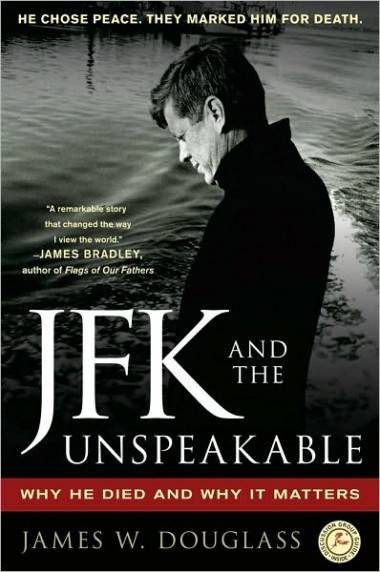In the annals of American history, few figures are as enigmatic as John F. Kennedy. His presidency was marked by an unprecedented confluence of exuberance and turmoil. In “JFK and the Unspeakable,” author James W. Douglass propounds a meticulously researched narrative that delves into the complexities surrounding JFK’s assassination. This book does not merely recount the events of that fateful day in Dallas; it embarks on an intellectual expedition, exploring the numerous socio-political undercurrents that contributed to this tragic outcome. The reader can expect a well-rounded synthesis of historical detail, political theory, and philosophical quandaries that ponder the broader implications of power, truth, and morality in the modern world.
At its core, “JFK and the Unspeakable” is distinctly analytical. Douglass artfully deconstructs the events leading to Kennedy’s assassination by juxtaposing the public persona of JFK with the private man behind the president. The book paints a vivid tableau of Kennedy’s internal struggle with the military-industrial complex and his evolving outlook on war and peace. Readers are invited into a labyrinthine examination of Kennedy’s decision-making processes as he grappled with issues such as civil rights, nuclear disarmament, and the controversial Cold War policies. Through this lens, Douglass transforms the text into a rich tapestry of conflicting ideologies that enveloped JFK.
The introductory chapters set the stage, transporting the reader into a post-war America engrossed in ideological fervor. It is against this backdrop that Douglass contextualizes Kennedy’s ascent. His examination of Kennedy’s interactions with key figures, such as Robert McNamara and Lyndon B. Johnson, provides readers with context that goes beyond mere biographical data. An intricate exploration of how Kennedy’s vision for a world free from nuclear arms ruffled the feathers of more hawkish elements within the government and military offers fascinating insights.
As the narrative unfolds, Douglass paints an increasingly complex portrait of the conspiracies that whirled around JFK’s administration—a web woven with strands of ambition, treachery, and disillusionment. The author’s relentless pursuit of truth elucidates his belief in a deeper conspiracy, a paradigm that transcends mainstream historical accounts. His hypothesis contends that Kennedy’s attempts to forge a path toward peace irrevocably endangered his life. This perspective serves as the cornerstone of Douglass’s thesis, compelling the reader to reconsider accepted narratives about power dynamics in the United States.
Douglass introduces the concept of “the unspeakable,” symbolizing both what was hidden from the public eye and the silence that enveloped the multitude of voices that perhaps wanted to speak out. This theme serves to underscore the paradox of a democratic society that often submerges truths under layers of institutional orthodoxy. This layered narrative is punctuated with poignant reflections on morality and ethics, challenging readers to ponder the cost of pursuing peace in a world driven by war.
A pivotal aspect of “JFK and the Unspeakable” is Douglass’s adeptness in weaving anecdotal evidence into the broader historical narrative. He revives lesser-known accounts and testimonies, significantly enriching the texture of the story. Through the experiences of those in close proximity to Kennedy—his family, friends, and aides—Douglass paints a portrait that feels personable yet profoundly significant. These accounts humanize JFK, allowing the reader to empathize with his struggles and aspirations.
Furthermore, the interplay of political philosophy and ethics is striking in this book. Douglass does not shy away from engaging in thought-provoking discussions about the ethical ramifications of political decisions. He interrogates the moral compromises made in the pursuit of power, and the disillusionment that follows. This dialogue transcends the narrative and encourages readers to consider contemporary parallels, drawing uncomfortable but necessary connections with modern political figures.
The tone of the book oscillates between investigative rigor and passionate advocacy. Douglass employs a meticulously scholarly approach while simultaneously infusing his prose with an emotional weight that stirs the conscience. The blend of factual analysis and ethical inquiry creates a compelling call to action, urging readers to critically evaluate the legacies of political leaders and the narratives we construct around them.
In addition to its rich content, “JFK and the Unspeakable” excels in its literary style. Douglass’s ardent prose captures the essence of complex moments with vivid imagery and poignant metaphors, anchoring the reader in the emotional landscape of historical events. The narrative flows seamlessly, moving between historical context, anecdotal evidence, and philosophical discourse. Through adept use of literary devices, readers find themselves both informed and emotionally engaged, compelled to reflect deeply on the questions raised.
As the book draws to a close, it leaves readers with not only a greater understanding of JFK and the circumstances surrounding his assassination but also a profound sense of urgency about the current state of our political landscape. The call for transparency, integrity, and moral courage resonates as strongly today as it did during Kennedy’s time. “JFK and the Unspeakable” is more than just a historical examination; it is an eloquent reminder of the perils of silence in the face of injustice and the ongoing struggle for truth in the murky waters of political power. For anyone seeking a comprehensive and thought-provoking exploration of this pivotal moment in history, Douglass’s analysis is an invaluable contribution that will linger long after the final page is turned.
